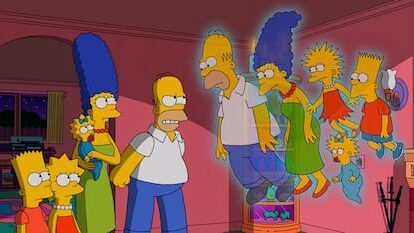BTN News: Matt Groening, the legendary creator of The Simpsons and Futurama, has spent over four decades revolutionizing modern humor with his sharp wit and unapologetic satire. His series have poked fun at everyone from U.S. presidents to global tech moguls like Elon Musk, and they’ve hilariously tackled sensitive topics such as obesity, stereotypes, and even the recent NFT craze. Groening, now 70 and with a net worth estimated at around $600 million, could have easily retired to the comfort of his Malibu home. Yet, his passion for storytelling, humor, and the absurdities of human existence keeps him in the game. Despite the changing social landscape and the increasing sensitivity around comedy, Groening remains committed to the principle of creative freedom—understanding that while he can joke about anything, he’s also open to criticism. His influence is so profound that contemporary humor simply wouldn’t be the same without his groundbreaking creations.
Groening’s dedication to his craft is evident in his ongoing work with The Simpsons and his more recent projects like Disenchantment and the newly revived Futurama. Despite the longevity and success of these shows, he has no intention of stepping away from the creative process. “Retirement? No way!” he declares, emphasizing his love for the work that has defined his career. For him, writing and producing these shows is more than just a job—it’s a way to stay connected with his inner child, who once dreamed of making people laugh with his stories.
Even in today’s fast-paced world, Groening continues to find joy in his creative meetings, which have evolved into virtual gatherings since the COVID-19 pandemic. These sessions are not just about work; they are a space for him to reconnect with his long-time collaborators and share a few laughs. The pandemic, which The Simpsons eerily predicted in an episode from its fourth season, has forced changes in how these meetings occur, but for Groening, the essence of the creative process remains unchanged.
The uncanny ability of The Simpsons to predict real-world events has become a cultural phenomenon. Fans frequently point out how the show seems to have a crystal ball, foretelling everything from political outcomes to technological advancements. Groening, however, remains humble about these “predictions,” attributing them to the absurdity of the world itself. As a long-time supporter of the Democratic party, Groening also recognizes the importance of being well-informed, a quality that undoubtedly contributes to the show’s prescient humor.
Over the years, Groening has seen the writing team behind The Simpsons and Futurama grow and diversify. While many of the original team members remain, new voices have joined the fold, bringing fresh perspectives and helping to keep the shows relevant for new generations of viewers. This generational shift has brought both challenges and rewards. Younger writers, who grew up as fans of the shows, often have a deeper understanding of the characters and the lore, which adds richness to the storytelling.
However, not all feedback has been positive. Groening has faced criticism, particularly regarding the portrayal of certain characters in The Simpsons. The 2017 documentary The Problem with Apu highlighted the problematic stereotypes embodied by the character Apu Nahasapeemapetilon. In response, Groening and his team made significant changes, such as replacing the original voice actors for non-white characters with actors who share the same racial background. While Apu remains in the show, he has not spoken in years—a decision that reflects the ongoing debate about representation in media.
Despite these controversies, The Simpsons and Futurama continue to be cultural touchstones, beloved by fans around the world. Groening marvels at the global reach of his creations, particularly in Spanish-speaking countries where the humor, though rooted in American culture, resonates deeply. He fondly recalls being recognized on the streets of Argentina, a testament to the universal appeal of his work. His connection to the Spanish language is also personal—his wife, Agustina Picasso, is Argentine, and their children are fluent in Spanish. Groening himself has picked up bits of the language, though he admits with a laugh that his understanding is limited.
As technology advances, Groening remains wary of the role that artificial intelligence might play in the creative process. While he acknowledges the impressive capabilities of AI in generating futuristic concepts, he believes that humor, with its deeply human nuances, remains beyond its reach. For Groening, storytelling, especially in the realm of science fiction like Futurama, is ultimately about the present, not the future. The advanced technology is just a backdrop for exploring the complexities and contradictions of contemporary life.
Reflecting on his long career, Groening expresses a sense of wonder at how far his simple drawings have come. From sketching a dysfunctional family based on his own parents to seeing his characters come to life on screen, the journey has been nothing short of a dream. With The Simpsons holding the record as the longest-running prime-time series in U.S. history, and Futurama enjoying a cult following even after multiple cancellations, Groening’s impact on popular culture is undeniable.
Despite the challenges and the ever-changing landscape of television, Groening remains optimistic about the future. He even holds out hope for a second Simpsons movie, though time constraints have made it difficult to bring that project to fruition. For now, he continues to focus on new episodes and storylines, eager to see what the next chapter holds for his beloved characters.
In a world increasingly dominated by artificial intelligence, Groening is determined to keep the human element at the heart of his work. As he looks toward the future, he remains committed to doing what he loves most: making people laugh. Whether through the antics of Homer Simpson or the misadventures of Fry and the Planet Express crew, Groening’s unique brand of humor will undoubtedly continue to resonate with audiences for years to come. And who knows—if the future is anything like Futurama, we might still be enjoying Groening’s work a thousand years from now.


